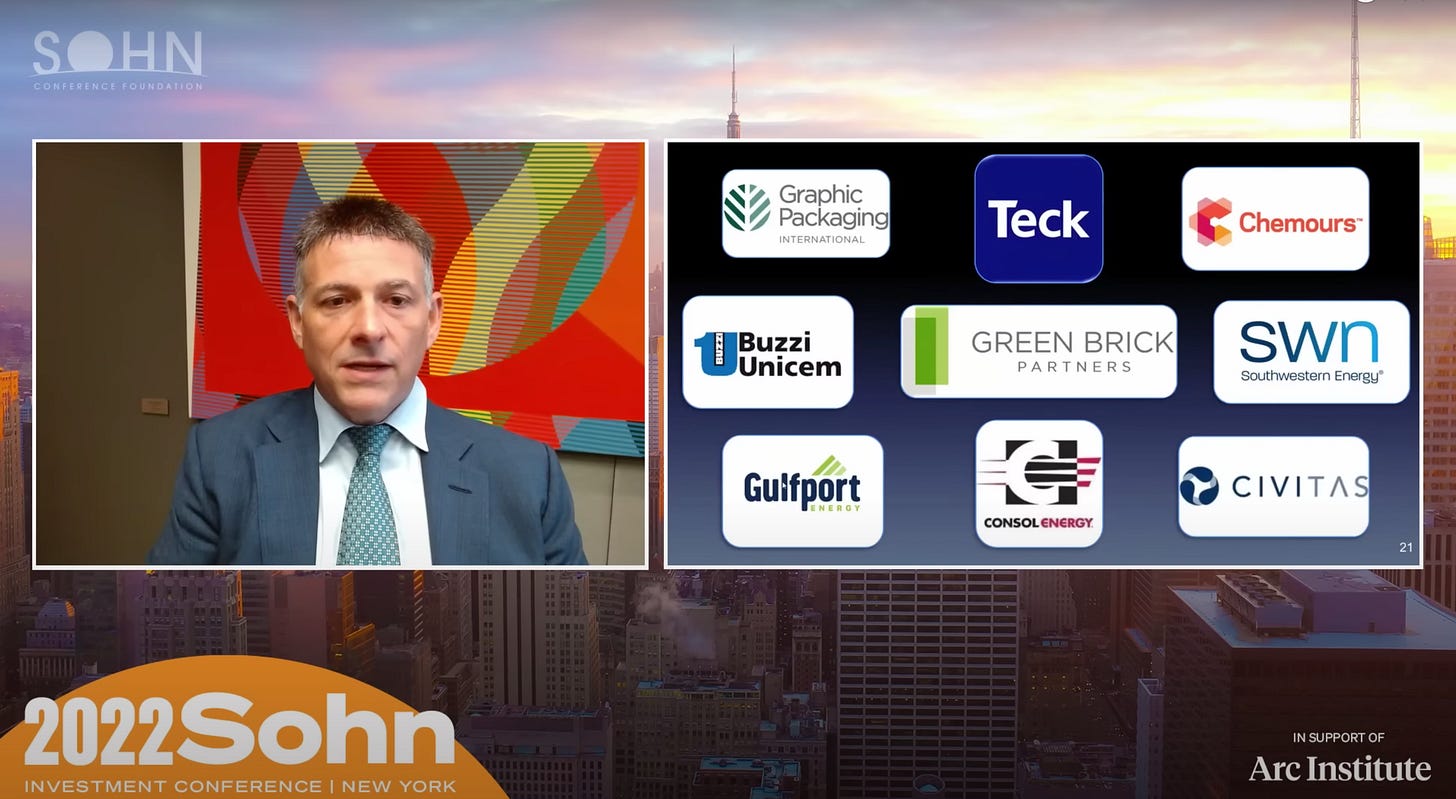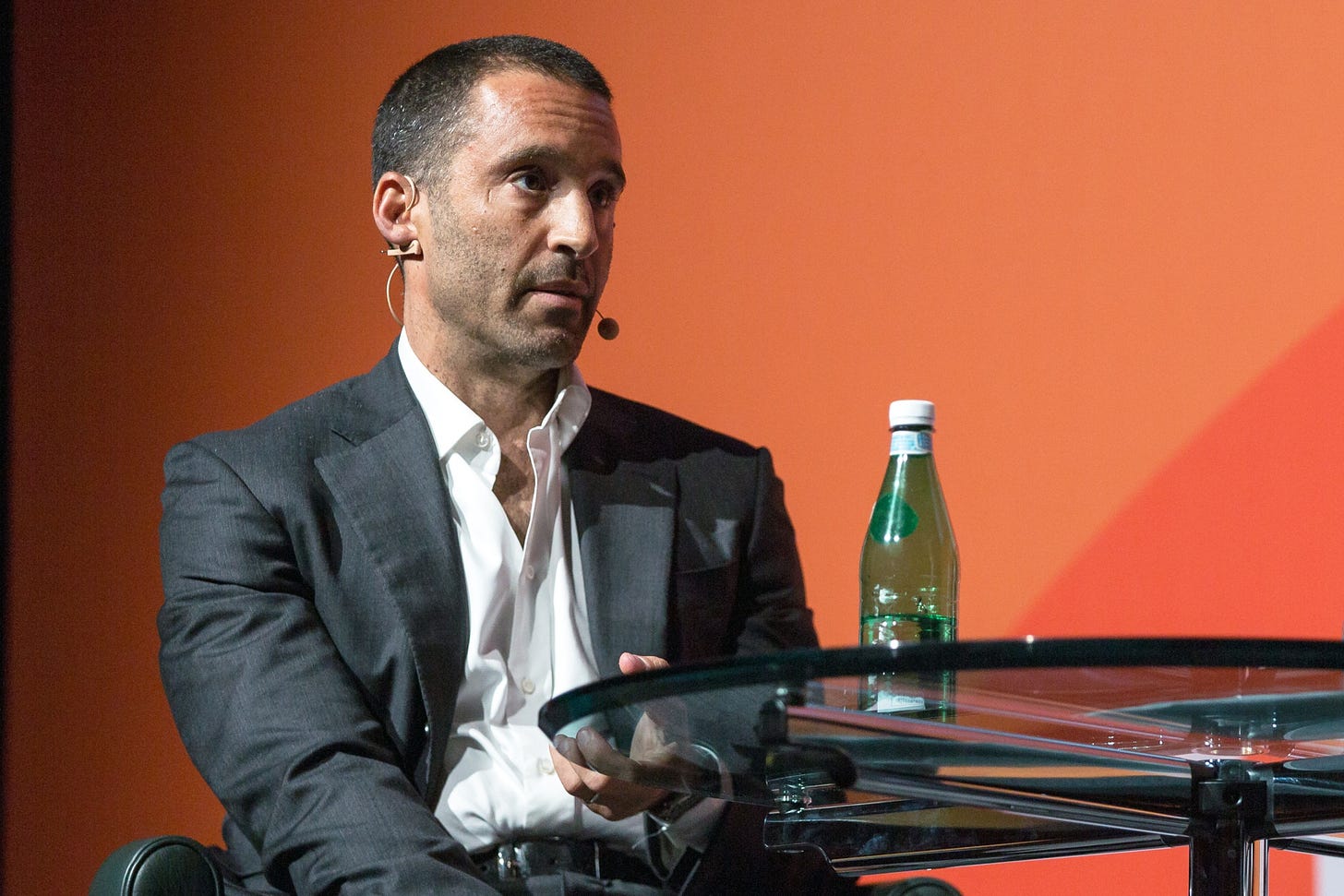Stanley Druckenmiller, David Einhorn, and Dan Sundheim Speak At The 2022 Sohn Investment Conference
Here are the highlights from the 3 hedge fund managers
The Sohn Investment Conference is an annual meeting that brings together leaders from all corners of the finance industry. This year, the three notable hedge fund managers that attended the event were Stanley Druckenmiller, David Einhorn, and Dan Sundheim. Other notable attendants included:
Bridgewater’s co-CIO of Sustainability: Karen Karniol-Tambour
SurgoCap Partners Founder and co-Portfolio Manager: Mala Gaonkar
Snowflake CEO: Frank Slootman
Shopify CEO: Tobi Lütke
FTX Founder & CEO: Sam Bankman-Fried
At the event, leaders discuss the latest innovations, investment strategies, and macroeconomic factors. Sohn also hosts its Sohn Idea Contest, where participants can pitch their highest conviction investment idea.
Last year’s winner was Albert Wang of Matrix Capital. Wang’s winning pitch was Twilio. The 2022 winner has not yet been announced at the time of writing.
Stanley Druckenmiller
Bear Market and Recession Factors
“We are 6 months into a bear market that has more room to run.”
“For those tactically trading, it’s possible the first leg of that has ended. But, it’s highly highly probable that the bear market has a ways to run.”
“I’ve lived through so many bears markets where if you get aggressive on the short side, you can get your head ripped off on rallies.”
“Given the extent of the asset bubble and the destruction in the markets, given what’s going on in Ukraine, giving zero Covid policy in China, I don’t take a lot of comfort from that. So, I assume, and pretty strongly, soon we’re going to have a recession sometime in 2023.”
“I assume we have a recession in 2023, I just don’t know if it’s in the 1H or 2H, but again this is a guess, not a fact.”
“45 years as a CIO, I’ve never seen such a constellation where there is no historic analogue. Right now I have more humility in terms of my views going forward than maybe ever. Very important to be open minded – the ending is not predictable. 2008 was a no brainer. This isn’t.”
“Once inflation has got above 5%…it’s never been tamed without a recession So, if you’re predicting a soft landing, you’re going against decades of history.”
Investment Strategy and Positioning
“In a bear market stagflation type of thing, I would want to own gold.”
“Was net short equities until 2-3 weeks ago. My anticipation is I will be going back to the short equity position at some point if the market affords me. If not, I will just sidestep a decline, not the worst thing in the world.”
“A lot of very good companies have derated 60-70% without a whole lot of change in fundamentals. Not yet ready to buy though, I’m too bearish on the world to go there yet. Some of these may be too cheap to be my shorts anymore, though.”
“If market rallies 15-20% from here, I will take a shot short equities because 6 month bear markets preceded by asset bubbles don’t exist, and I still think we have a lot of wood to chop.”
“Things are a lot harder now. We are now getting definitive signals that the economy is weakening, particularly at the front end. While I’m not comfortable owning bonds, I’m much less comfortable being short fixed income vs. 3-6 months ago when it looked like a much better risk reward.”
“Best economist is inside of the stock market (cyclicals vs. defensives), it’s allowed us to outperform Fed economic forecasts for 20-30 years. Second best economist is the bond market, though this has been distorted by QE for the last 10 years.”
Industry Specific
“Today homebuilders are down 50% despite supposedly good fundamentals, trucking down 40% despite record earnings, retailers down – there are signs that there is economic trouble ahead.”
“Stocks tend to lead the fundamentals by somewhere between 6-12 months, and certain industries tend to lead the economy. The obvious one everyone knows about is housing. Housing is traditionally looked as a leading indicator. Retail has a slight lead, capital goods has a lag.”
David Einhorn
Bear Market and Recession Factors
“U.S. debt to GDP has exploded. When Paul Volcker raised interest rates to 19% in 1981, the U.S. debt to GDP was just 30%. Heading into the global financial crisis, it was about 60%. Today, it is twice that and much of this new national debt has been purchased by the Fed and sits on its balance sheet.”
“Despite how shocking it is, the surge of inflation is actually understated. Everyone understands that inflation is even worse than the actual reports. Since 1980, the Bureau of Labor Statistics has changed the way it calculates inflation. They’ve added hedonic adjustments for quality improvements, quirky substitution changes, and importantly, suppressed rising home prices from the calculation. Larry Summers just published a paper showing had the methodology not changed, just on housing, inflation today would rival the peak from 1980.”
“With inflation running at about 8%, it’s hard to for us to understand why an interest rate of around 3% would be neutral. If the Fed were to continue using the balance approached rule that it regularly cited under Chair Yellen, a neutral rate today would be about 7%.”
“It is monetary policy 101 that to defeat inflation, you need positive real interest rates. In 1980, Volcker raised rates to 19% to combat 14% inflation. Greenspan raised rates in 1990 to 8.5% to fight 6% inflation. Even Burns raised federal funds to 13% to fight 11.5% inflation, but retreated too quickly to get the job done.”
“Today, we have real interest rates at the most negative level in 70 years.”
Investment Strategy and Positioning
“Eventually is not a good enough time horizon for a hedge fund. However, my thought today is that eventually is now, or at least it is soon enough that gold is a buy.”
Einhorn’s comments on the companies above:
“In gratuitous reference to our portfolio, this lack of new supply means that companies in these industries are likely to earn excess profits for an extended period of time, making these sectors attractive long investments.”
Industry Specific
“Rather than stimulate supply, the U.S. is threatening wind-fall profit taxes on (energy) producers and the G7 companies in Japan just pledged to stop most fossil fuel financing by the end of 2022.
“Our supply problems aren’t limited to a short-term inability to get goods from China, but extend to a decade of structural under investment and capacity in the so called “old economy.” For years, there was no real interest in investing in cement, steel, concrete, fertilizer, chemicals, paper, mining, traditional energy, and housing.”
“All the work to curtail inflation will have to come from the demand side. As a result, price will have to go much higher to dissuade substantial consumption. As such, inflation is likely to be much more persistent.”
Dan Sundheim
Bear Market and Recession Factors
“The problem with having macro views typically is that they tend to come out in extreme statements. People like to say it’s gonna be the 1970s, or its gonna be Japan. At the end of the day, that can happen, but that’s a very small percentage of the potential outcomes.”
“My view is that the Fed is probably being way too lenient on monetary policy, theres a lot of savings built up, there’s a lot of pent up demand. But, the Fed changes course all the time. They don’t know that much more than we do. When they get proven wrong, they will adjust.”
“There’s only so much liquidity you can pump into the system until you run out of bullets.”
Investment Strategy and Positioning
“Valuation, business model, and management team are like the three things (we look at). We don’t spend a lot of time trying to predict quarterly earnings.”
“We have three business, privates, long stocks, and short stocks. I’d argue privates should hopefully be our most lucrative given that its illiquid so you should get a premium.”
“If the Glassdoor reviews are bad, it’s a pretty big red flag.”
“You short stocks for two reasons. One is because you think it’s a good business, it generates alpha. And two, is for risk management purposes, you want to mitigate volatility.”
I don’t particularly worry about short-term volatility, so the idea of shorting stocks to mitigate market volatility never resonated with me, it was always just to generate alpha.”
“I think Amazon is probably more inflation-hedged than people would think. But right now, the market’s treating Amazon like as if it’s directly negatively impacted by inflation. I guess it’s probably neutral if I were to say. If you look at the fundamentals of Amazon, I’d say that they’re not huge beneficiaries of inflation, nor are they terribly hurt by inflation.”
“I think that human nature places a premium on reduced volatility in the short-term at the expense of higher returns in the long-term.”
“I don’t need to short stocks to hedge the companies I buy, but I don’t think theres anything wrong with shorting stocks. I don’t think it’s evil, I think it’s good for markets. We do it, it’s just not front and center the most important thing that drives our firm.”
“The moat that Netflix has, I see as being not penetrable because the amount they’re spending on content and the reach they have.”
“We don’t own Twilio, but I think it’s a great idea.”
Question on if he could own once company out of Google, Apple, Facebook, Microsoft and Amazon for the next 10 years, which one would he pick?:
“I’d say Amazon. I’d just like to think that if you were to put your money into something, the durability of business models is probably the most important thing. I think they all have incredibly durable business models, but Amazon’s business model is not built upon technology. It’s a logistics company in a day and just like railroads a hundred years ago and other forms of transportation that were dominant logistics companies. I think Amazon’s going to be a very difficult company to displace.”
Industry Specific
“I think that long-term, the real core value of online grocery will be derived from advertising. The core businesses will be profitable, but grocery margins are slim.”
“I think the big social media businesses have been established by now. I think that Facebook probably has a better chance of being the most important platform of the next generation of social media than anyone does of displacing Facebook.”
“I am actually not sure whether AR/VR will be the next big thing in social media. Facebook is likely to be the winner.”
“I think the world in 10 years will be entirely streaming. I don’t think that there will be any linear cable.”
“I’m really bullish on used-car sales online. We have investments privately in Europe, Latin America, and we hold a big position in Carvana in the U.S. The simple analysis is that this is a way better consumer experience than going to a lot and negotiating with a used-car salesmen. It’s a better value proposition and there’s massive economies of scale. So, I think you look out 15 years from now, I think you could see a case of 30% of used-car sales are done online.”
Hedge Vision - Institutional Insights
Please don’t hesitate to send me topic recommendations, suggestions, or general questions. You can contact me by email: HedgeVisions@gmail.com, or by Twitter messages @HedgeVision
Sources
Sohn 2022 Conference - Stanley Druckenmiller
Sohn 2022 Conference - David Einhorn







